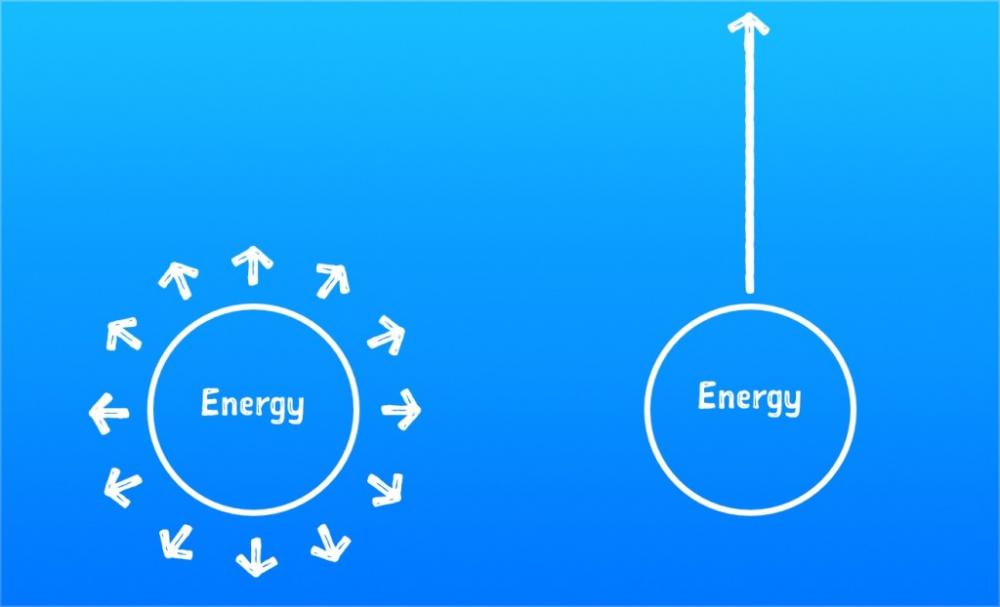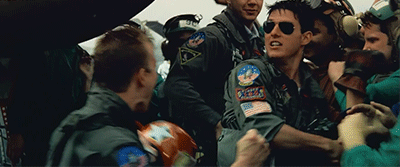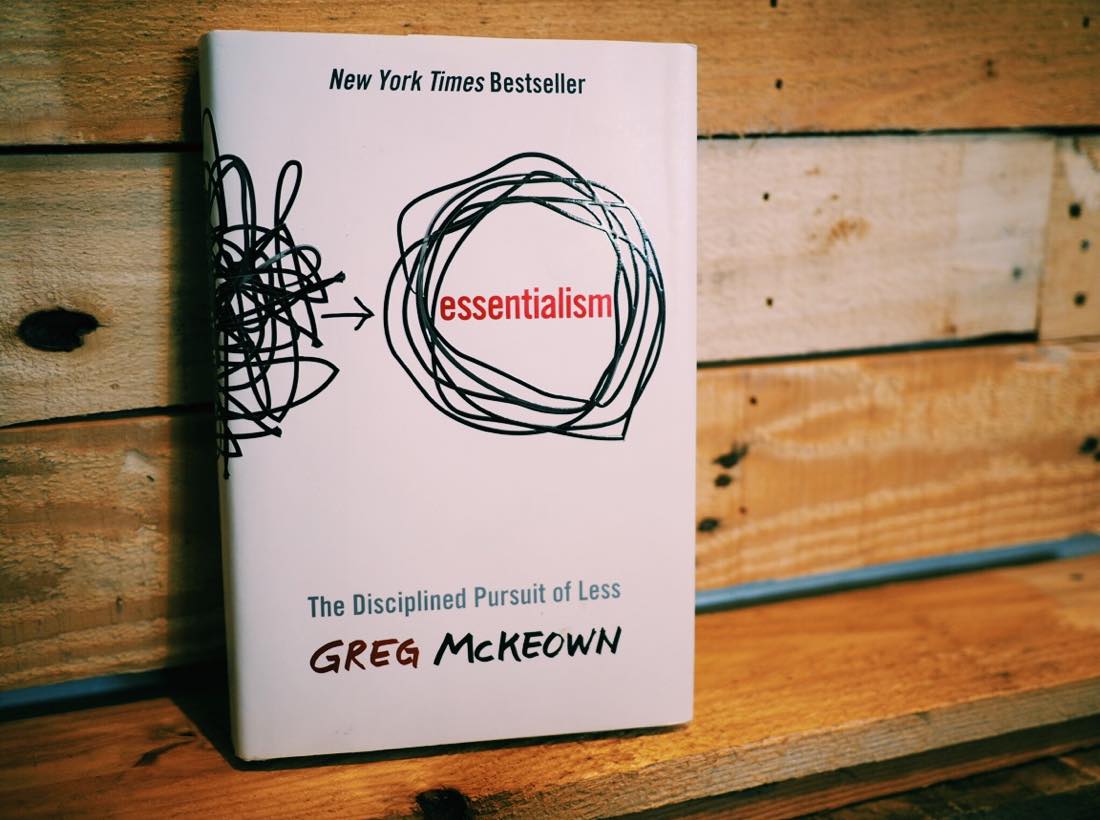Essentialism
Focus Club: Book Review
by Greg McKeown
By far and away, Essentialism by Greg McKeown was one of my favorite books of 2015, and it continues to be a book I reference often and recommend to others.
You can buy the book here:
What Greg McKeown advocates in his book is the opposite of “the undisciplined pursuit of more”. Which turns out to be the disciplined pursuit of less.
Check out the drawing below. On the left you have the undisciplined pursuit of more. And on the right you have the disciplined pursuit of less.

This diagram compares the difference between our efforts when we have many pursuits versus focusing in on just one thing….
…and, as a Focus Club member, that’s kinda what we are all about… Focus!
When we are spending a little bit of time on a million different projects, areas of responsibilities, tasks, and activities, then we make very little progress on any of them. And our efforts are stretched thin. However, if we focus our energy on only the most important things — that which is essential — then we make meaningful progress. Not to mention, it just feels more rewarding to focus on one important thing and do it with excellence.
There are so many great quotes in this book. As I’m thumbing through the pages just now, I feel like there is a highlight on every page.
Some of our favorite quotes from the book.
- The way of the Essentialist is the relentless pursuit of less but better. (pg. 5)
- In many cases we can learn to make one-time decisions that make a thousand future decisions so we don’t exhaust ourselves asking the same questions again and again. (pg. 7)
- If you don’t prioritize your life, someone else will. (pg. 10)
- The pursuit of success can be a catalyst for failure. Put another way, success can distract us from focusing on the essential things that produce success in the first place. (pg. 13)
- We have lost our ability to filter what is important and what isn’t. Psychologist call this “decision fatigue”: the more choices we are forced to make, the more the quality of our decisions deteriorates. (pg. 15)
- When we don’t purposefully and deliberately choose where to focus our energies and time, other people—our bosses, our colleagues, our clients, and even our families—will choose for us, and before long we’ll have lost sight of everything that is meaningful and important. We can either make our choice deliberately or allow other people’s agendas to control our lives. (pg. 16)
- What if society stopped telling us to buy more stuff and instead allowed us to create more space to breathe and think? What if society encouraged us to reject what has been accurately described as doing things we detest, to buy things we don’t need, with money we don’t have, to impress people we don’t like? What if we stopped being oversold the value of having more and being undersold the value of having less? What if we stopped celebrating being busy as a measurement of importance? What if instead we celebrated how much time we spent listening, pondering, meditating, and enjoying time with the most important people in our lives? (pg. 26)
- To harness the courage we need to get on the right path, it pays to reflect on how short life really is and what we really want to accomplish in the little time we have left. As pet Mary Oliver wrote: “Tell me, what is it you plan to do / with your one wild and precious life?” (pg. 26-27)
- When we surrender our ability to choose, something or someone else will step in to choose for us. (pg 35)
- We often think of choice as a thing. But a choice is not a thing. Our options may be things, but a choice—a choice is an action. (pg. 35)
- We live in a world where almost everything is worthless and a very few things are exceptionally valuable. As John Maxwell has written, “You cannot overestimate the unimportance of practically everything.” (pg. 45)
- Focus is something we do. (pg. 65)
- We are built to play and built through play. When we play, we are engaged in the purest expression of our humanit, the truest expression of our individuality. (pg. 86)
- Play is an antidote to stress, and this is key because stress, in addition to being an enemy of productivity, can actually shut down the creative, inquisitive, exploratory parts of our brain. (pg. 87)
- If you think you are so tough you can do anything I have a challenge for you. If you really want to do something hard: say no to an opportunity so you can take a nap. (pg. 94)
- Our highest priority is to protect our ability to prioritize. (pg. 101)
- If the answer isn’t a definite yes then it should be a no. (pg. 103)
- As you evaluate an option, think about the single most important criterion for that decision, and then simply give the option a score between 0 and 100. If you rate it any lower than 90 percent, then automatically change the rating to 0 and simply reject it. (pg. 105)
- When there is a serious lack of clarity about what the team stands for and what their goals and roles are, people experience confusion, stress, and frustration. When there is a high level of clarity, on the other hand, people thrive. (pg. 121)
- When there is a lack of clarity, people waste time and energy on the trivial many. When they have sufficient levels of clarity, they are capable of greater breakthroughs and innovations—greater than people even realize they ought to have—in those areas that are truly vital. (pg. 121-122)
- When people don’t know what the end game is, they are unclear about how to win, and as a result they make up their own game and their own rules as they vie for the manager’s favor. Instead of focusing their time and energies on making a high level of contribution, they pull all their effort into games like attempting to look better than their peers, demonstrating their self-importance, and echoing their manager’s every idea or sentiment. (pg. 122)
- Teams without purpose become leaderless. With no clear direction, people pursue the things that advance their own short-term interests, with little awareness of how their activities contribute to (or in some cases, derail) the long-term mission of the team as a whole. (pg. 123)
- Only with real clarity of purpose can people, teams, and organizations fully mobilize and achieve something truly excellent. (pg. 129)
- So why is it so hard in the moment to dare to choose what is essential over what is nonessential? One simple answer is we are unclear about what is essential. (pg. 134)
- In virtually every instance, clarity about what is essential fuels us with the strength to say no to the nonessentials. (pg. 135)
- Essentialists accept they cannot be popular with everyone all of the time. (pg. 139)
- Only when we admist we have made a mistake in committing to something can we make a misstake a part of our past. When we remain in denial, on the other hand, we continue to circle pointlessly. There should be no shame in admitting to a mistake; after all, we really are only admitting that we are now wiser than we once were. (pg. 150)
- A good editor is someone who uses deliberate subtraction to actually add life to the ideas, setting, plot, and characters. (pg. 157)
- There are two basic questions the editor should be addressing to the author: “Are you saying what you want to say? and, Are you saying it as clearly and concisely as possible?” Condensing means saying it as clearly and concisely as possible. (pg. 160)
- An editor’s job is not just to cut or condense but also to make something right. (pg. 161)
- Boundaries are a little like the walls of a sandcastle. The second we let one fall over, the rest of them come crashing down. (pg. 165)
- “Give me six hours to chop down a tree and I will spend the first four sharpening the axe.” —Attributed to Abraham Lincoln (pg. 175)
- We can’t know what obstacles to remove until we are clear on the desired outcome. (pg. 190)
- What are all the obstacles standing between me and getting this done? (pg. 190)
- What is the obstacle that, if removed, would make the majority of the other obstacles disappear? (pg. 190)
- Research has shown that of all forms of human motivation the most effective one is progress. (pg. 196)
- Instead of starting big and then flaring out with nothing to show for it other than time and energy wasted, to really get essential things done we need to start small and build momentum. Then we can use that momentum to work toward the next win, and the next one, and so on until we have a significant breakthrough—and when we do, our progress will have become so frictionless and effortless that the breakthrough will seem like overnight success. (pg. 197)
- Nonessentialists tend to be so preoccupied with past successes and failures, as well as future challenges and opportunities, that they miss the present moment. They become distracted. Unfocused. They aren’t really there. The way of the Essentialist is to tune into the present. To experience life in kairos, not just chronos. To focus on the things that are truly important—not yesterday or tomorrow, but right now. (pg. 217)
Nice work, !
Congrats on doing today’s assignment.
